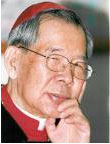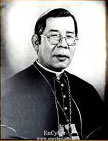Stephen Cardinal Kim Sou-Hwan RIP
By Fr Donal O’Keeffe
The author is a Columban from Ireland and has served as superior of the Columbans in Korea. ‘Sou-Hwan’ used by the author here and ‘Suwhan’ used by Father O’Rourke in his poem are anglicized variations of the Korean personal name of the late cardinal.
On Monday 16 February at 6.12pm Cardinal Kim died in St Mary’s Hospital, Seoul. Within an hour the crowds were gathering at the Cathedral to  receive the body which arrived at 9.30pm. Beginning that night and during the following three days over 400,000 people filed past the coffin to pay their respects. It was an unprecedented display of affection and respect for the man they called the ‘kun orun’(literally the ‘great elder’). People of all religious persuasions, young and old alike, came to see him for the last time. The cathedral was full and the church yard was overflowing for the funeral on the Friday the 21st which was broadcast live on all the networks.
receive the body which arrived at 9.30pm. Beginning that night and during the following three days over 400,000 people filed past the coffin to pay their respects. It was an unprecedented display of affection and respect for the man they called the ‘kun orun’(literally the ‘great elder’). People of all religious persuasions, young and old alike, came to see him for the last time. The cathedral was full and the church yard was overflowing for the funeral on the Friday the 21st which was broadcast live on all the networks.
Kim Sou-Hwan (Stephen) was born in May 1922 in Taegu in the province of Kyongsangdo to a fervent Catholic family. His grandfather Kim Bo-hyun (John) was arrested and martyred in Seoul in 1868 during the last persecution of Christians in Korea. His grandmother was also to be executed with him but was released because she was pregnant. The child born was Kim Young-sok (Joseph) who was to become the father of Kim Sou-hwan. Following his elder brother the future cardinal entered the minor seminary in 1933, the year the Columbans came to Korea. He was ordained in 1951 and in 1966 was appointed bishop of Masan - a small rural diocese. He was the youngest bishop in the country when appointed Archbishop of Seoul in April 1967 and was made a cardinal the following year by Pope Paul VI. In his own words the appointment was as ‘a bolt of lightning from a clear sky’ – totally unexpected. In his homily at the Mass of installation he set out his vision of a church for the people, especially the marginalized. Faithful to his word he began to speak out on issues of Justice. His Christmas Mass of 1971 was abruptly cut off the air when he criticized the government.
 But he would not be silenced. During the following decades Cardinal Kim became the conscience of the nation and Myongdong Cathedral became synonymous with the struggle for freedom. But it was his actions which spoke louder than his words. In 1986 when Seoul city evicted people to make room for a new development in preparation for the 1988 Olympics the cardinal invited the families to live in the cathedral grounds. He set up two huge tents and there, in the heart of the business and tourist centre of Seoul, those families lived with meals being cooked in the church yard and children playing around the entrance to the cathedral. This continued for months until a settlement was negotiated.
But he would not be silenced. During the following decades Cardinal Kim became the conscience of the nation and Myongdong Cathedral became synonymous with the struggle for freedom. But it was his actions which spoke louder than his words. In 1986 when Seoul city evicted people to make room for a new development in preparation for the 1988 Olympics the cardinal invited the families to live in the cathedral grounds. He set up two huge tents and there, in the heart of the business and tourist centre of Seoul, those families lived with meals being cooked in the church yard and children playing around the entrance to the cathedral. This continued for months until a settlement was negotiated.
In June 1987 students took refuge in the grounds after a rally for democracy and the police threatened to come in and arrest them. But the cardinal told the government: ‘If you come in you will first have to trample over me, then the priests, then the sisters and only then will you take the students’. Cardinal Kim was truly the voice of the people.
He was also a great friend of the Columbans. He was a young student in the minor seminary in Taegu when the Columbans first came to Korea in 1933 and stayed there for six months. I recall him sharing with us that he remembered ‘the foreign priests playing football in their cassocks’. In his book he mentions the inspiration of the Shilimdong ‘house of love’ where Columbans had moved in to work with the poor in a new way. He was always thankful to the Columbans for building so many parish communities in Seoul in the 1970s and 1980s when people were pouring in from the countryside.
The impact of Cardinal Kim was not confined to Korea. He was an influential church figure in Asia and one of the driving forces behind the establishment of the Federation of Asian Bishops Conferences (FABC). Cardinal Kim was one of four Asian cardinals who traveled to Rome to meet with Pope Paul VI to discuss the initiative. The result was formal recognition in 1972 despite misgivings by the Curia who were nervous of regional bishops’ organizations because of their experience with CELAM (the Latin American Bishops’ Conference).
In the days following his death, like people all over the country, we were sharing our memories, our stories of the man. Everyone seemed to have their favorite story. My own goes back to 1977 when I was a student at language school. That year the Brothers of Charity came to Korea at the invitation of the cardinal. So when trying to decide where they would establish their house they sought the advice of the cardinal. He suggested that they visit different parishes and inquire if they were any destitute persons living in the area. However, everywhere they went the reply was similar – ‘There are poor people but no one destitute or living rough - there might be people like that in India or the Philippines but not here’.
More than a little downhearted, they returned to Myongdong and told their story to the cardinal. He just asked them to meet him the following morning at dawn in front of the cathedral. When they arrived he was waiting for them dressed in civilian clothes and wearing a baseball cap. They set off together on a city bus until they came to a dried-out riverbed. Following the cardinal they got off and went down and, under a bridge, they came across a group of men sleeping rough. After a simple greeting they went back up on the road and continued on their journey. That morning the cardinal brought them to some other similar places and on the way back to the cathedral he told them, ‘Do not believe those who tell you that we don’t have destitute people in Korea. They just do not know’. That happened 32 years ago but for me it sums up the man – he was always in contact with the marginalized and reaching out to them.
After retirement in 1998 he set up his own home page and responded personally to all who wrote to him. Children knew him as ‘Grandfather’ – he always answered their mail. His last act was to donate his eyes. That gesture really touched many people. In fact in the aftermath of his death organ donation rates have soared thirty-fold in Korea. Then his funeral was so simple – his request that there would be nothing ostentatious was respected – to the degree that even the wreath sent by the president was returned with thanks.
Korea is now mourning the death of a great citizen and the Church mourns the passing of a pastor and a prophet. And yet as I witnessed the genuine grief, the mourning and the funeral, I had an uneasy feeling that the process of domesticating the memory of the Cardinal was already beginning. In the funeral homily the focus was on the love practiced by him, how thankful he was to everyone, in particular the people who were around them in his last days. All churches in Seoul archdiocese now have banners over the entrances containing a photograph of the cardinal and the words ‘Thank you, let us love each other’. But the cardinal always spelt out the concrete meaning of love. He named the issue of the day, be it the rights of workers, or the rights of people to housing. He never flinched from mentioning the word ‘justice’ or identifying who was marginalized and spelling out the root causes of marginalization. But such prophetic proclamation is noticeably absent today. The old axiom comes to mind: ‘The one who controls the present controls the past, and the one who controls the past controls the future’. As always, the challenge to each of us is that we strive to be genuinely faithful to ‘the dangerous memory’.
You may write the author at: St Columban’s. CPO Box 1167, SEOUL 100-611, KOREA or email him atokeeffe.donal@gmail.com
